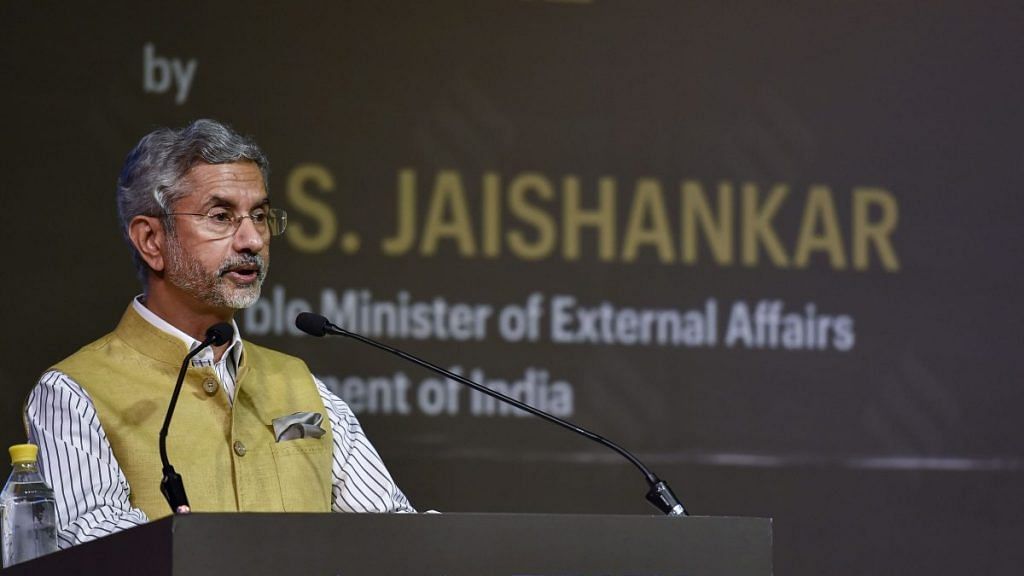In his brilliant and breathtakingly candid speech at the Fourth Ramnath Goenka Lecture in New Delhi Thursday, External Affairs Minister S. Jaishankar offered an “unsentimental audit of Indian foreign policy”. He blamed misguided consistency and a lack of hard-headedness for the past failures of India’s foreign policy. This was indeed a rare speech for any government functionary to make in any country. Jaishankar called for greater realism in India’s foreign policy, junking the “dogmas of Delhi”.
It is difficult to disagree with his audit. The problem is that the lessons he draws from history sit uneasily with his analysis of the current international situation and his prescription for Indian foreign policy. At its core, there is greater continuity than Jaishankar is willing to acknowledge and an unfortunately persistent refusal to acknowledge some of the consequences of power.
The continuity first: India has thought, since its pre-independence days, that it somehow had a special mission in world affairs, an unfortunate tendency that shows little signs of ebbing. Our first Prime Minister Jawaharlal Nehru and his many followers thought that India was uniquely moral: even now, many want Indian power to be the ‘power of its example’. And it continues: the only difference is that India is now the ‘vishwaguru’, and yoga has replaced disarmament as the new Indian solution to the world’s problems. Realism would acknowledge a simple truth: India is not a gift to the world (nor is any other country, of course) and there is little to be gained through such fruitless pursuits.
Also read: What IFS Jaishankar’s speeches reveal about Minister Jaishankar’s roadmap for India
The unipolar world order
Another continuity that is difficult to understand is India’s relations with Russia. This is as weak today as it was in 1962, when Moscow essentially abandoned New Delhi during the crucial weeks of the India-China war. Deepening Indian dependence on country that is deepening its dependence on China is hardly a sign of unsentimental realism.
Next, the consequences of power. It is difficult to square Jaishankar’s emphasis on power with his mischaracterisation of the current international order, which is based on the distribution of power among countries. That the world is becoming multipolar, or is already one, has been an obsessive but grossly mistaken belief with Indian officialdom for some time, and Jaishankar bases a good part of his analysis on this unfortunate error. Multipolarity exists only when there are several roughly equal great powers. That is hardly the condition that we witness today. The world is still arguably unipolar: the US continues to straddle the world in a way unmatched by any other country. Despite its spectacular growth, militarily, China is only able to challenge the US in waters close to the Chinese territory. No other nation can do even that. American influence over global institutions and norms remains overwhelming. Americans are indeed tiring of the onerous burdens of hegemony, but even this may be exaggerated.
Also read: Jaishankar defines India’s place in new world: Open for business, but conditions apply
India’s strategy in US-China dominated world
Even more importantly, what is most likely to replace unipolarity, whenever that happens, may not be multipolarity but bipolarity, with China joining the US at the top. China is, currently and for the foreseeable future, so much wealthier than India and other countries that it is meaningless to talk of all of them as comparable powers. Jaishankar acknowledges the disparity in power between China and India but it seems to play no part in his analysis of the current international order or India’s options in foreign policy.
This is not a pedantic distinction. Indian strategy must differ depending on what type of international order we inhabit for, as Jaishankar points out, “a misreading of the larger landscape can prove costly.” A strategy that makes sense in a multipolar order will not be appropriate for a bipolar one. But that is exactly what Jaishankar appears to be suggesting. A belief in a “growing multipolarity” and “greater space for regional powers” can indeed lead to a strategy of “hedging”. There are more options in a multipolar world, a greater chance to build support through “multiple engagements.” But how can this be done when the two key powers, the US and China, are so much stronger than everyone else? Is a Brazil or even a France a match for China? Since they are clearly not, how can engagements with them help to balance the far stronger China? If it was indeed a multipolar world and these were all equally powerful poles, the logic may be understandable. But the disparity between China and other countries is so stark that this makes no sense in the current circumstance.
Also read: 5 key highlights of India’s foreign policy that Jaishankar amplified in the US
Jaishankar’s audit frank, but needs to go further
Even worse, hedging is particularly dangerous when one of the powers is your neighbour, one with which you have significant conflicts. India could hedge during the Cold War because it faced no military threat from either the US or the Soviet Union, and it was far from both, a situation very different from what India faces today. Moreover, India’s position has become relatively weaker in the last two decades vis-à-vis China, a glaring fact that no realist should ignore, and one that has to be the foundation for strategy making.
Jaishankar’s frank appraisal and clear thinking is something we need more of considering the challenges India faces. But it should go even further, which suggests that the dogmas of Delhi are not that easy to shake.
The author is professor in International Politics at Jawaharlal Nehru University, New Delhi. Views are personal.
